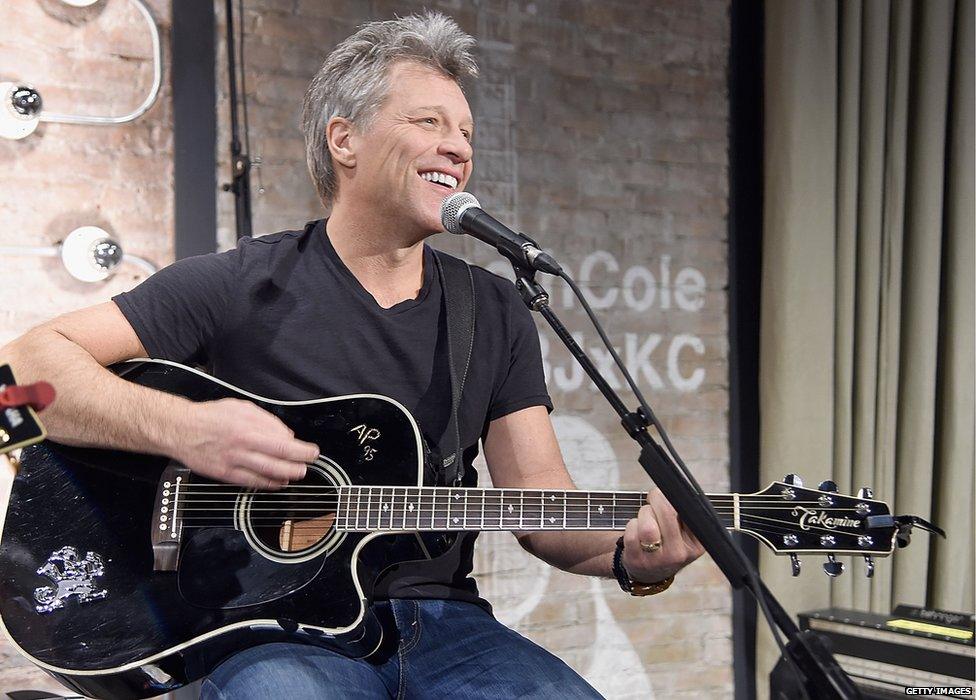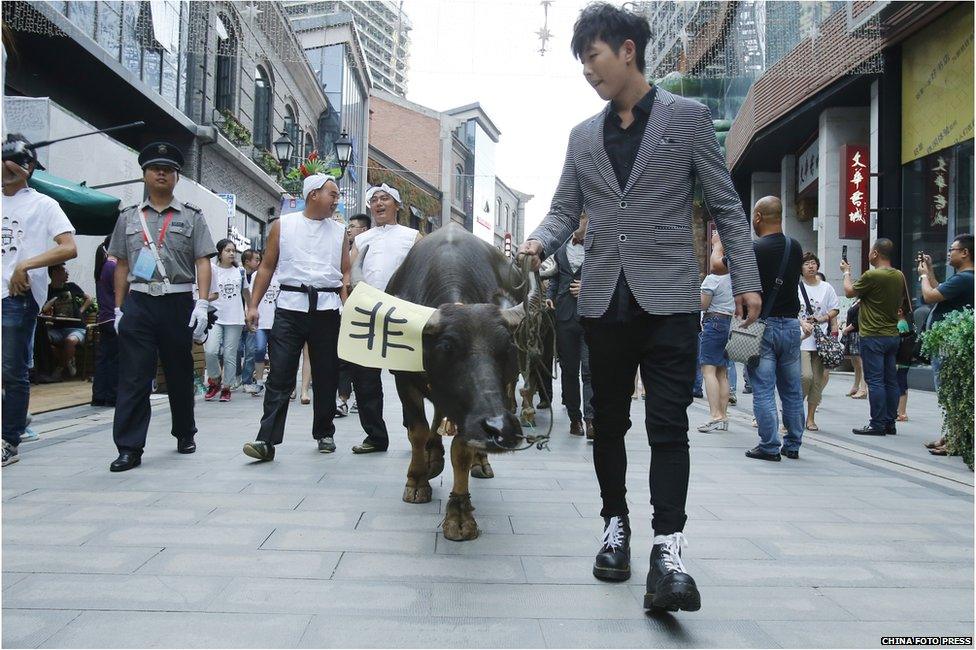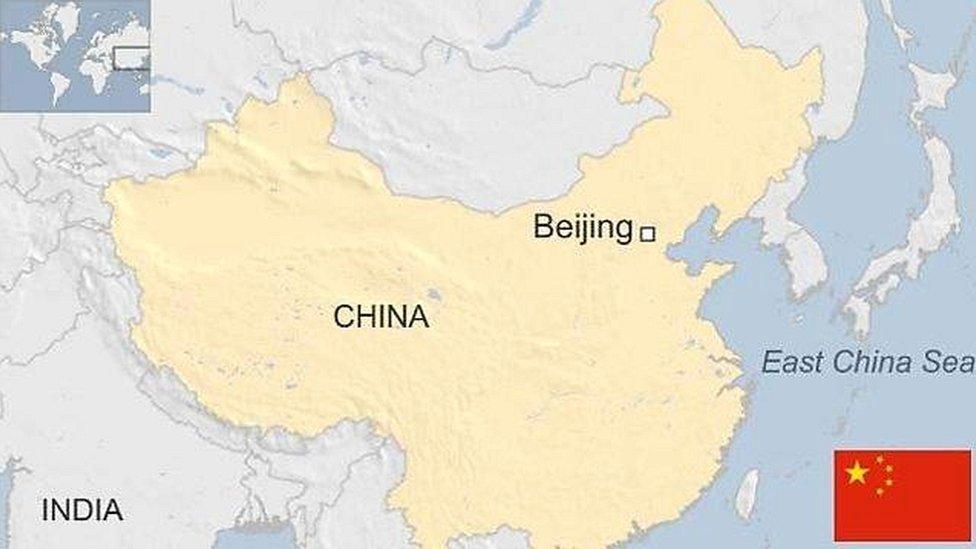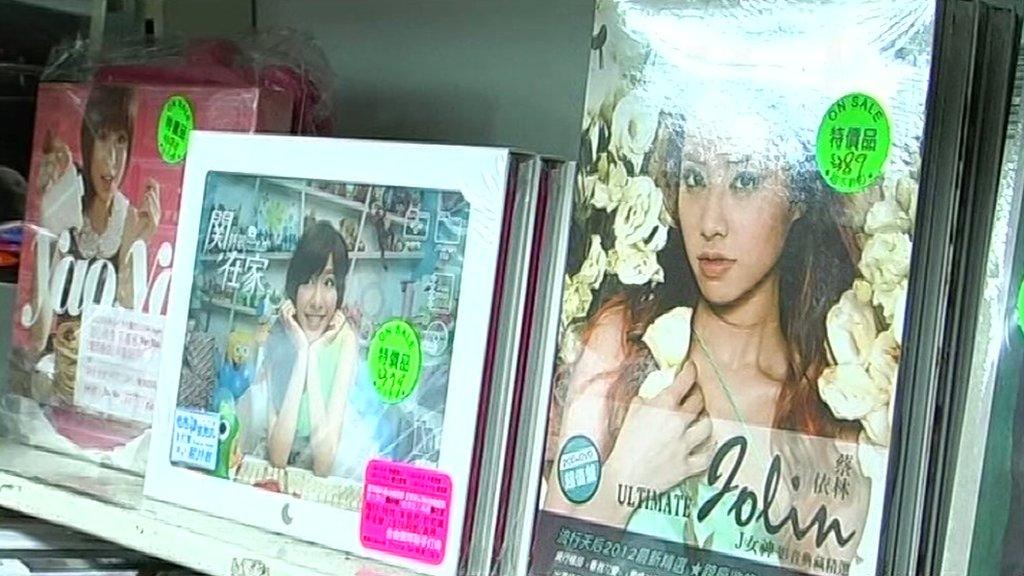Jon Bon Jovi takes on Chinese classic love song
- Published
Jon Bon Jovi's music video shows him practising his Mandarin pronunciation
Jon Bon Jovi has become the latest Western pop star to woo the Chinese market, singing what is arguably the most famous Chinese love song ever. The BBC analyses his attempt.
The music video, external, set in a recording studio, starts in soft focus as the soulful opening strains of The Moon Represents My Heart cue up.
Then, Jon Bon Jovi's familiar gravelly voice fades in. "Ni wen wo ai ni you duo shen, wo ai ni you ji fen..." croons the American rock star in somewhat intelligible Mandarin.
"Jon put a lot of thought on choosing the right song for his Chinese fans," reads a statement , externalon his website announcing the video.
Shot through the heart

The American rock star is set to do a series of concerts across Asia in September
The rocker clearly has big ambitions by taking on The Moon Represents My Heart - the song ranks as one of the greatest love ballads and is a beloved karaoke staple, external for older Chinese people.
The plaintive ballad, popularised by Taiwanese superstar Teresa Teng, external in 1977, is sung from the perspective of a woman whose love is being questioned - her answer is that her love is as eternal as the moon.
You ask me how deeply I love you, how much I love you
My feelings are real, my love is also real, the moon represents my heart
You ask me how deeply I love you, how much I love you
My feelings will never move, my love will never change, the moon represents my heart
The gentlest of kisses has opened my heart
The deepest of love affairs, I think about it till today
You ask me how deeply I love you, how much I love you
Just think about it, just take a look, the moon represents my heart
The song is closely identified with Ms Teng though she was not the original singer, and this is one reason why it remains so popular particularly in China.
Ms Teng's career took off in Asia in the late 1970s just as Communist China began to open up, and she quickly became a household name in the mainland.
After years of suppression of pop music, the spread of her ballads marked one of the first encounters mainland Chinese had with the "decadent" modern music of the outside world. Many listened to her in secret and pirated her music, despite a government ban.
Gift of love
Jon Bon Jovi's statement said he chose the "heart-warming classic for Chinese fans as a gift on Chinese Valentine's Day".
But there are actually two Chinese Valentine's Days.
One is Qixi Festival, which falls on 20 August this year. It marks the seventh day of the seventh lunar month, and is linked to the legend of the Cowherd and the Weaver Girl - star-crossed lovers who remain separated but reunite one day every year.

A Hubei TV station staged a promotional stunt for its variety show on Wednesday with male actors playing the role of the Cowherd on the streets of Wuhan city
The other Valentine's Day is Yuanxiao Festival, which marks the end of the traditional Lunar New Year celebrations.
Crowd-pleaser
It's no coincidence that the video was released ahead of Jon Bon Jovi's Asia tour in September, where he'll be playing in China for the first time.
He is also performing in other places with significant Chinese populations such as Macau, Taiwan, Singapore and Malaysia.
While Western pop stars regularly play in Asia, it's rare for them to sing in Mandarin - but it's a guaranteed crowd-pleaser and helps to boost their profile.
In February 2013, Celine Dion wowed audiences when she sang the folk song Jasmine Flower, external for the CCTV Chinese New Year Gala. It is said to be the most watched television show in the world, with hundreds of millions in mainland China and Mandarin speakers in other countries tuning in every year.

Celine Dion is best known in China and elsewhere in Asia for her 1997 hit My Heart Will Go On
Just speaking in Mandarin is enough for a Western personality to win fans over in China, as Facebook founder Mark Zuckerberg found when he spoke to university students in October - though he received more mixed reviews.
'Quite sincere'
So how have the Chinese taken to Jon Bon Jovi's attempt?
It hasn't generated much buzz on microblogging network Weibo - yet - but initial reviews appear to be positive, with many moved by his attempt to sing in Mandarin.
The music video features several shots of the 53-year-old looking stumped as he ploughs through the song and practises his pronunciation. At one point, a woman who appears to be his Mandarin tutor gives him an encouraging thumbs-up.
"Bon Jovi's too hardworking, he's given us Chinese fans a nice Qixi surprise... you can see in the video that he's continually trying to get the lyrics right, it's quite sincere," noted popular Weibo blogger Eargod.
Other fans were more circumspect. Said user Zhufuaguai: "Even though it sounds horrible, it's still Bon Jovi - and that's enough for me."
- Published25 August 2023

- Published13 January 2013
